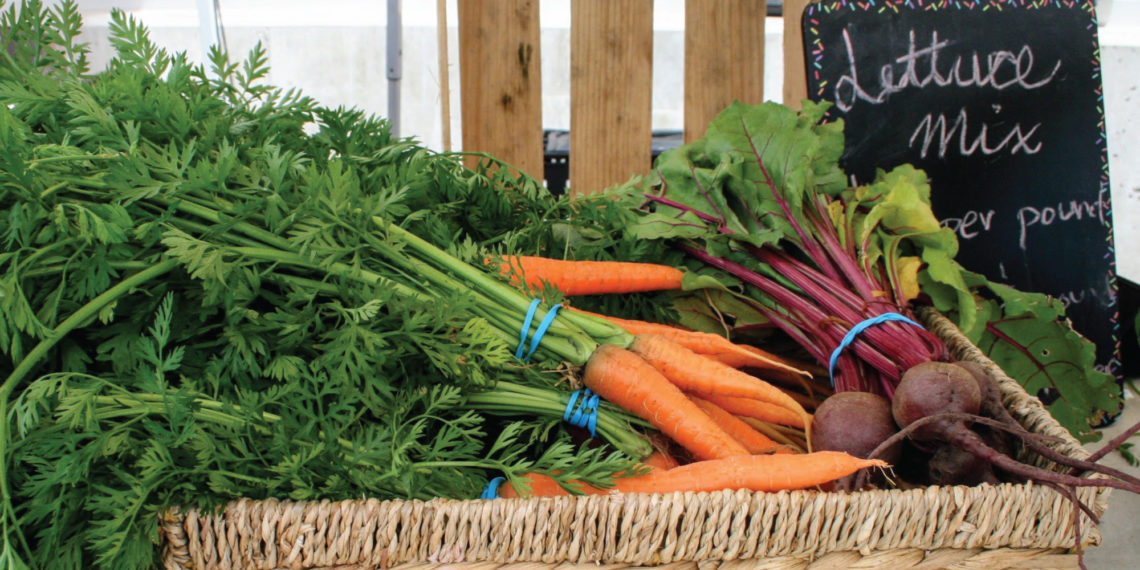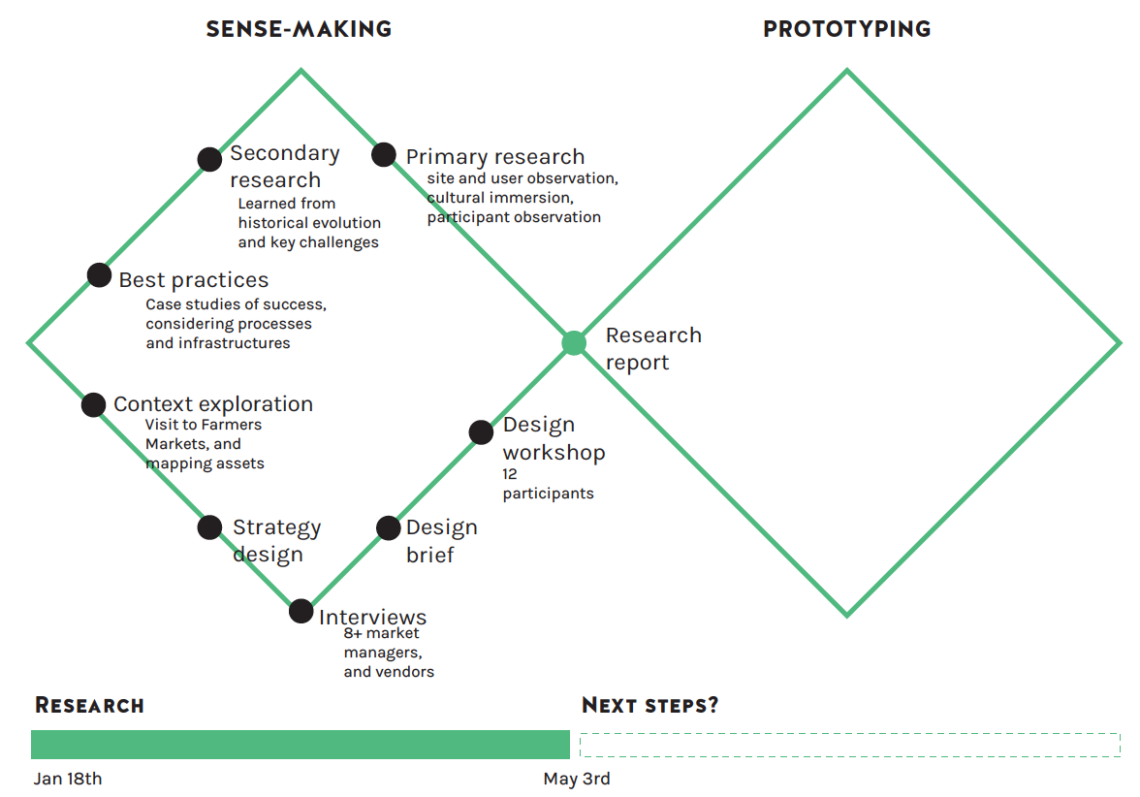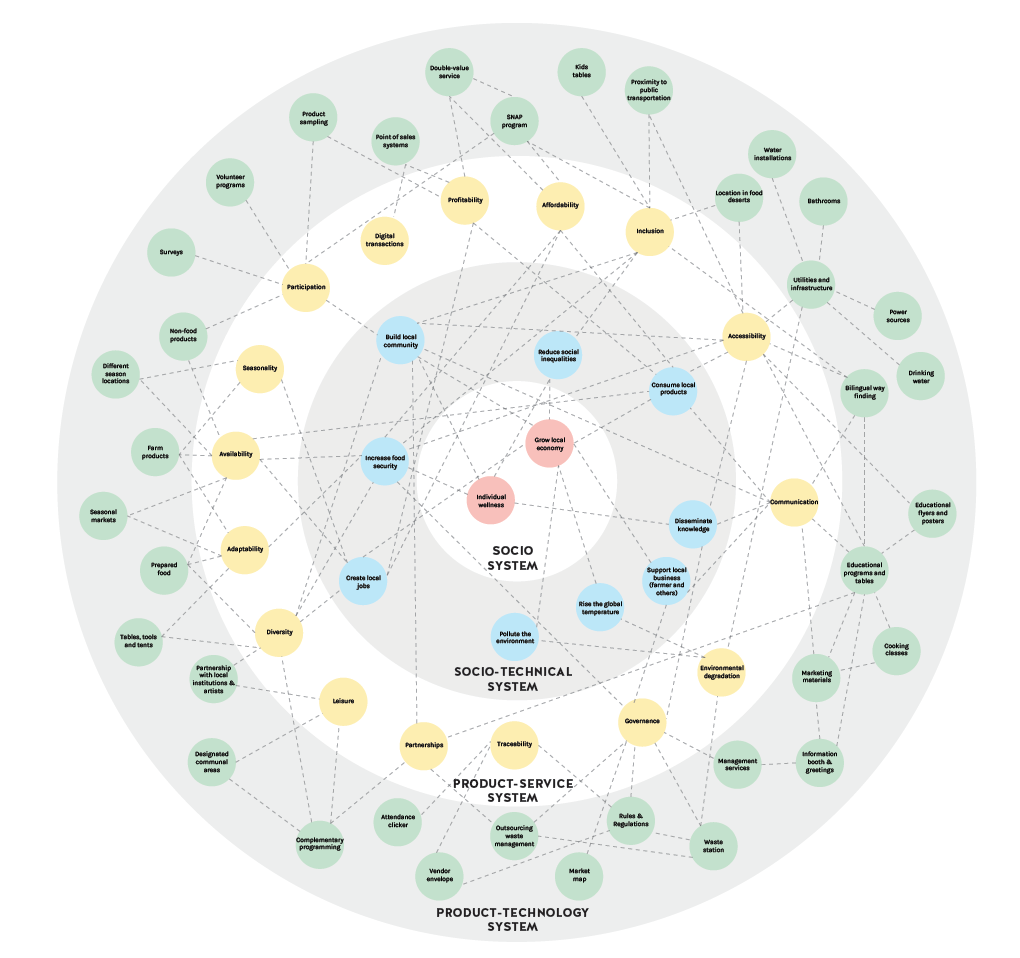
Synopsis
This project is part of the 2017 grant-awarded ERIF research “Designing Sustainable Systems Solutions”, led by Carlos Teixeira, associate professor at IIT Institute of Design, Weslynne Ashton, associate professor at IIT Stuart School of Business, and Andre Nogueira, PhD Candidate at IIT Institute of Design. The research is based on a partnership between IIT and Plant Chicago, and focuses on designing new strategies for sustainable systems solutions at the facility level.
In order to better understand the circular economy landscape of farmers’ markets in Chicago, Elizabeth Lyon, from Plant Chicago, and Andre Nogueira, conducted a research project considering related initiatives currently being employed at farmers’ markets across the city. Plant Chicago is a non-profit organization located on the south side of Chicago with a mission to cultivate local circular economies. This mission is carried out through education, research, and farmers market programming. Plant Chicago recently began working to develop collective activities with co-located businesses at The Plant, an industrial building located on the south side of Chicago that serves as a co-location and community building space for local food and beverage businesses.
Challenge
In order to support an increasingly urbanized population, cities need to reconsider the principles sustaining decision-making, and reimagine their processes through which critical infrastructure is developed, especially those around waste, water, energy, and food access. The city of Chicago generates over 2,200 tons of food waste every day, has over 400,000 residents living in “food deserts”, and depends on non-renewable sources for 96% of energy demand. These are interconnected problems being reinforced by an economy based on the linear, “resource in, waste out” thought process.
As public spaces that collectively attract hundreds of thousands of visitors each year in Chicago, farmers’ markets hold immense potential to demonstrate, promote, and engage businesses and residents with circular economy practices. However, markets face many barriers including lack of adequate funding, staffing, information, energy and waste diversion infrastructure, and collaboration, all of which make it difficult to understand and implement circular economy practices at a citywide level. Little research exists on the history and current state of farmers’ markets in Chicago, let alone on their challenges or successes related to waste diversion, sustainable packaging, and energy use.
Whereas farmers’ markets have increasingly aimed to support local businesses while also attempting to tackle food insecurity and malnutrition throughout Chicago, the challenge of how local circular economy practices (e.g. waste diversion, sustainable packaging, and energy use) should be incorporated into the rules, regulations, and daily operations of the market itself, is yet to be uncovered.
Circular economy at the local scale
While the circular economy movement has gained traction in various sectors over the last decade, little attention has been given to the complexity behind social interactions or to the infrastructure, tools, and methods required to promote such paradigm shift at the local level. For example, when applying the three principles defined by Ellen MacArthur Foundation in platforms for community development (e.g. farmers’ markets), it is still unclear how they should be incorporated, especially when dealing with challenges related to environmental sustainability, social justice, and economic equity. Although still a working definition, we have been exploring the local circular economy as a collaborative practice sustained by local circulation of materials, nutrients, knowledge, and money; and empowered by principles of transparency, diversity, and inclusion.
Methodology
We relied on systemic design research methods to approach the complex systemic issue of local circular economy in farmers’ market in Chicago. We used eight lenses (social, financial, cultural, digital, natural, physical, governance, individual) to guide the research with the goal of learning about the barriers to, and opportunities for, implementing practices to advance the circular economy at Chicago farmers markets. We visited different farmers’ markets, grocery stores, restaurants, urban farms, community center and research institutions, and engaged with local vendors, farmers market managers, customers, and peer organizations to conduct the research from January through May 2018.
Practice-based learning
The project was developed as a final stage of the ERIF grant award. The goal was to transfer design know-how and design capabilities to Plant Chicago through a practice-based experience. Throughout the Spring semester of 2018, the researchers engaged in series of activities to integrate dispersed knowledge about circular economy practices across farmers’ markets in Chicago. Researchers interviewed participants about their personal and professional experiences, and the infrastructure supporting their activities. This allowed them to gain a rich perspective of the circular economy landscape in farmers’ markets around the city. The team then shared their findings and hosted a workshop with farmers’ market managers and other representatives of circular economy initiatives in Chicago to validate some of the interpretations being made, as well as to explore potential principles that could inform alternative paths to increase impact. Because this is a work in progress, findings are intended to provide new paths for market managers to advance on circular economy practices in Chicago.


Work in progress
The approach taken allowed researchers to understand that farmers’ markets are a platform in the city. When intervening in platforms such as farmers’ markets, it is important to understand the integration of multiple systems (e.g. food, mobility, education, healthy, economy, natural) and the interactions among actors (e.g. customers, vendors, market managers, property owners, volunteers). In order to do so, researchers conducted ethnographic research on both users and infrastructures. They focused on understanding the infrastructure shaping the interactions among actors, and how the multiple systems were being integrated. In both we utilized the eight lenses to expand our perception of the dynamics of the systems.
The diagram above maps the existing features, the actionable properties they currently afford users to do, the impacts they generate, and their relationships with the intended goals of farmers’ market platforms. This is a tool being developed in my PhD, and is useful to understand the systemic complexity for advancing local circular economy and how interventions might consider the multi-level integration of various systems. For example, researchers learned that even though diversity is allowing for a variety of offerings, it is not addressing challenges of social inequalities.
Upon analysis, researchers generated 100+ insights from the data. The team also used system dynamic tools in combination with the innovation lenses approach to identify multiple interactions among agents. By doing so, they were able to uncover seemly unrelated variables, and identify patterns across different data.
These four patterns were presented in a workshop with the goal of validating some interpretations, while exploring alternative paths to advance local circular economies. In pursuit of these goals, design-led interactive activities were promoted to co-define principles for future engagements that will guide farmers’ markets in advancing circular economies in Chicago.
The research and results from the workshop directed researchers to four actionable properties that are required from market managers to advance local circular economies. They are here presented as opportunity areas for intervention and impact. They are not meant to be exhaustive, rather an indication of what’s possible with collaboration across stakeholders and organizations.
Education: Market managers should provide proper infrastructure to disseminate the knowledge.
Collaboration: Market managers should organize and intentionally support one another.
Facilitation: Market managers should structure goal-oriented interactions to sustain engagements.
Coordination: Market managers should ensure collaborations lead to actions.